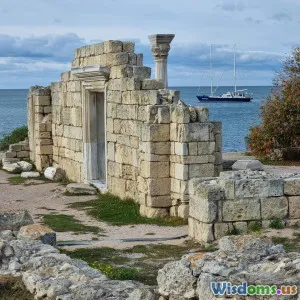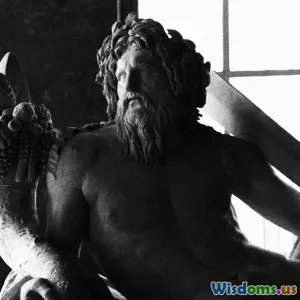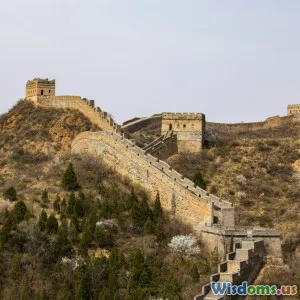
Breaking Down Plato’s Republic For Modern Life
10 min read Explore timeless wisdom from Plato's Republic and how it applies to contemporary challenges in politics, ethics, and society. (0 Reviews)
Breaking Down Plato’s Republic For Modern Life
Plato’s Republic is one of the most influential philosophical texts ever written—yet it is often pigeonholed as an archaic treatise, disconnected from the nuances of contemporary life. This perception couldn’t be further from the truth. At its core, the Republic is a profound investigation into justice, society, and human nature, themes that remain deeply relevant in an era marked by political turmoil, ethical dilemmas, and social instability.
In this article, we will dissect Plato's key ideas and translate them into modern contexts, providing clarity on how to apply his timeless wisdom to current civic and personal challenges.
Introduction to Plato’s Republic
Written around 380 BCE, Plato’s Republic is a Socratic dialogue that explores what justice means and how an ideal society should be structured. The work is split into ten books, wherein Socrates debates with various interlocutors about the nature of justice, the ideal city (the Kallipolis), and the philosopher-king as ruler.
Far more than a political manifesto, the Republic raises fundamental questions about human virtue, knowledge, and the relationship between the individual and the state. Key ideas include the tripartite structure of the soul and society, the theory of forms, and the allegory of the cave.
Why Read Plato Today?
Modern societies grapple with questions Plato raised over 2,000 years ago. Issues like inequality, effective governance, and the pursuit of truth dominate discourse globally. Plato helps us question surface-level assumptions, urging deeper reflection on what constitutes a just social order.
Core Philosophical Concepts in the Republic
Justice and the Tripartite Soul
Plato defines justice not merely as legal adherence but as harmony within the city and within the individual. He argues that just society mirrors the tripartite nature of the soul:
- Reason (wisdom)
- Spirit (courage)
- Appetite (desires)
In an ideal state, reason governs, spirit enforces, and appetite obeys. Similarly, in individuals, justice exists when these parts perform their roles in balance.
“Justice is doing one’s own work and not meddling with what is not one’s own.” — Plato, Republic (Book IV)
This analogy compels us to view personal virtue as integral to social justice, prompting reflection on how our inner discipline translates to participation in collective well-being.
The Ideal City and the Philosopher-King
Plato’s vision of the perfect city features a rigid class structure with three groups: rulers, auxiliaries (warriors), and producers (farmers, artisans). The rulers, or philosopher-kings—those who love wisdom and understand the forms—are uniquely qualified to govern.
While the rigid tripartite social hierarchy may seem impractical or authoritarian today, the underlying principle—leadership grounded in knowledge and virtue rather than power or wealth—is profoundly relevant.
For instance, modern demands for technocratic governance, where experts guide complex policy decisions, echo this idea. The challenge remains ensuring that expertise is tempered by ethical responsibility and democratic accountability.
The Allegory of the Cave
Perhaps the most famous metaphor in Western philosophy, the cave allegory illuminates the struggle between illusion and reality, ignorance and enlightenment.
Prisoners shackled in a cave perceive only shadows on the wall, mistaking them for reality. When one escapes and sees the true world outside, returning to convey this truth incurs disbelief and hostility.
This allegory invites contemplation on the value of education, critical thinking, and confronting uncomfortable truths—a message urgently needed in today’s age of misinformation and ideological polarization.
Translating Plato’s Ideas into Modern Life
Justice as Social Harmony Beyond Legalism
Modern legal systems often focus narrowly on codified statutes and punishments. Plato’s broader vision of justice encourages us to consider social roles and relationships holistically.
For example, workplace justice goes beyond compliance with labor laws — it involves fostering meaningful collaboration where each individual’s contribution is respected and their well-being prioritized.
Similarly, effective civic participation requires educational systems that cultivate reason and virtue, preparing informed citizens capable of balancing their desires with societal good.
Case studies show that communities emphasizing restorative justice—mediation and reconciliation rather than only punishment—yield reduced recidivism and healthier social bonds, aligning with Platonic justice as harmony rather than mere rule enforcement.
Philosophical Leadership in the Age of Complexity
The need for leaders who combine deep expertise with ethical integrity is evident in responses to global crises such as climate change and pandemics.
Take New Zealand’s Prime Minister Jacinda Ardern, praised for empathetic yet decisive leadership during the COVID-19 crisis. Her approach parallels Plato’s philosopher-king ideal by blending wisdom, courage, and concern for citizens’ welfare.
Strengthening institutions to support meritocratic, virtue-driven leadership remains a critical task, as disillusionment with populist or corrupt governance rises worldwide.
Enlightenment and the Pursuit of Truth
In a digital era dominated by social media echo chambers and fake news, Plato’s cave allegory urges constant vigilance about where our knowledge originates.
Promoting media literacy and critical thinking from early education helps individuals escape intellectual “caves.” Initiatives like Finland’s comprehensive media education model show measurable improvements in students’ ability to discern misinformation.
Furthermore, public discourse benefits when channels prioritize transparency and fact-checking, reducing the ‘shadows on the wall’ of distorted narratives.
Practical Applications: How to Harness Plato Today
Personal Reflection and Self-Governance
Incorporate daily self-reflection habits to assess whether reason directs actions or impulses dominate—echoing Plato’s tripartite soul. Journaling, meditation, and philosophical reading cultivate inner harmony, resulting in clearer thinking and ethical behavior.
Civic Engagement and Education
Advocate for educational reforms that emphasize critical reasoning and ethical deliberation over rote memorization.
Engagement in community dialogues, voter education programs, and participatory governance aligns with Plato’s vision of democratic preparation, mitigating fragmentation and fostering collective justice.
Leadership Development
Organizations and governments can establish mentorship and training focused not only on skills and knowledge but also on moral responsibility and servant leadership.
By prioritizing character development alongside expertise, institutions craft leaders equipped to navigate uncertainty with wisdom—a modern embodiment of Plato’s philosopher-king.
Addressing Criticisms and Modern Challenges
While Plato’s ideals inspire, they raise critical questions. The rigid class stratification can conflict with modern egalitarian values. His dismissal of democracy (labeled by Plato as mob rule) might seem undemocratic or elitist.
Modern reinterpretations can embrace the essence—leadership by the knowledgeable and just—without authoritarian means. Experimentation with deliberative democracy, where informed citizens discuss and guide decisions, offers a viable middle ground.
Additionally, while Plato’s ideal city may sound utopian, many principles—balancing self-interest with community good, the pursuit of wisdom, and justice as harmony—remain adaptable guiding lights.
Conclusion: Plato’s Republic as a Living Dialogue
Plato’s Republic is not a dusty artifact but a vibrant conversation starter. Its rich exploration of justice, leadership, and human nature demands active engagement and reinterpretation in light of today’s sociopolitical landscape.
By embracing justice as harmony within and without, cultivating virtuous and knowledgeable leaders, and relentlessly pursuing truth beyond illusions, we empower both individuals and societies to flourish.
Ultimately, applying Plato’s insights invites us to ask: Are we, individually and collectively, creating a just life—a life where reason guides our spirits and desires toward the good of all?
References
- Plato. The Republic. Translated by G.M.A. Grube and revised by C.D.C. Reeve, Hackett Publishing, 1992.
- Nussbaum, Martha. The Fragility of Goodness. Cambridge University Press, 2001.
- Finnis, John. Natural Law and Natural Rights. Oxford University Press, 2011.
- “The Philosophy of Leadership: Lessons from Jacinda Ardern.” Harvard Business Review, 2021.
- “Finland’s Media Literacy Education and Its Effects,” Journal of Media Education, 2019.
- Braithwaite, John. Restorative Justice and Responsive Regulation. Oxford University Press, 2002.
Rate the Post
User Reviews
Other posts in Philosophy of Ancient Civilizations
Popular Posts


















